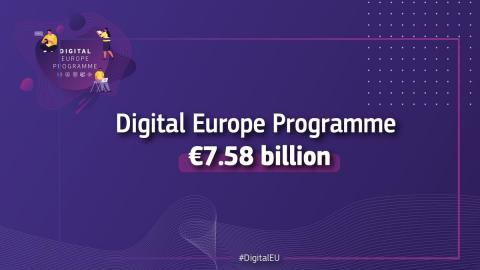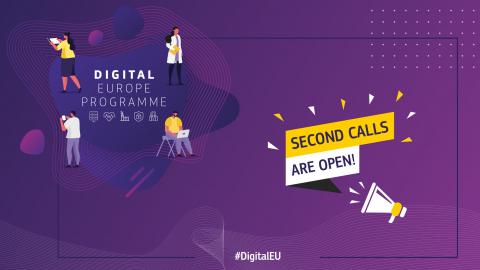Promoting European innovation in education
If you are an EdTech start-up/SME with a project to promote #DigitalEducation in EU, a Call for #tech proposals is OPEN until 17 May, under The Digital Europe Programme!

Expected Outcome
The project will support closer collaboration in the digital education sector in Europe amongst European EdTech start-ups/SMEs and other relevant stakeholders and across Europe. It will foster the exchange of good practices at pan-European level, aiming at increased capacities of the national education systems and at distance, innovative, effective and inclusive learning. It will also foster increased opportunities for the European EdTech industry, while promoting European ethical values regarding the use of educational technologies and data shared in Europe. It will contribute to increasing synergies and complementarity between initiatives in digital education, in particular in view of the Erasmus programme and Horizon Europe. It will also help the education sector to be better prepared for possible future crises such as additional lock-downs due to the Covid-19 pandemic.
Objective
This action will support the digital transformation of the education sector at European level by boosting innovation in education in Europe by supporting EdTech start-ups and SMEs to accelerate their disruptive EdTech solutions. The project will support the strategic priority of the Digital Education Action Plan 2021-2027 and in full synergy with, and complementarity to, the objective of setting up a European Digital Education Hub and in line with the European Education Area framework.
Scope
The selected project will:
- Host a pan-European network to promote European excellence in educational innovation by bringing together European EdTech start-ups/SMEs, with other relevant actors such as technology providers, industry associations and investors, policy makers and ministries, schools, teachers, universities, research organisations, experts and NGOs, and linking this network to other existing pan-European networks/fora.
- Support cooperation between EdTech start-ups/SMEs and other stakeholders of a maximum number of Member States and Associated countries to exchange best practices, analyse successful applications of digital technologies and potential market uptake, explore lessons learned during and after the Covid-19 crisis. This should be done in close cooperation with the development of the European Education Area.
- Support EdTech companies with business and educational mentoring and training services and by gaining insights and understanding market trends and needs by collecting comprehensive and high-value up-to-date data to better understand the EdTech start-ups/SMEs landscape in Europe.
- Develop guidelines aiming at fostering a wider European EdTech industry for the development of digital education content, solutions and tools, in light of technological needs (connectivity, platforms, interoperability, standardisation, security and privacy issues, use of emerging technologies such as AI or data) as well as pedagogical, societal and ethical aspects, based on relevant scientific evidence and in consultation with European Education area stakeholders.
- Propose a roadmap towards a European EdTech ecosystem promoting European excellence in educational innovation, including how local, regional, national and European efforts can be combined.
About the Digital Europe Programme
How to make Europe greener and more digital are the twin challenges for our generation, and our success in meeting them will define our future. The European Commission has begun to look at a greener Europe through the lens of the European Green Deal. At the same time, it is opening up discussions about the move to a more digital world: the digital transition.
Digital technology and infrastructure have a critical role in our private lives and business environments. We rely on them to communicate, work, advance science and answer current environmental problems. At the same time, the COVID-19 pandemic highlighted not only how much we rely on our technology to be available to us, but also how important it is for Europe not to be dependent on systems and solutions coming from other regions of the world.
Paving the way for achieving this goal is the Digital Europe Programme (DIGITAL), a new EU funding programme focused on bringing digital technology to businesses, citizens and public administrations.

The Digital Europe Programme will provide strategic funding to answer these challenges, supporting projects in five key capacity areas: in supercomputing, artificial intelligence, cybersecurity, advanced digital skills, and ensuring a wide use of digital technologies across the economy and society, including through Digital Innovation Hubs. With a planned overall budget of €7.5 billion (in current prices), it aims to accelerate the economic recovery and shape the digital transformation of Europe’s society and economy, bringing benefits to everyone, but in particular to small and medium-sized enterprises.
The Digital Europe Programme will not address these challenges in isolation, but rather complement the funding available through other EU programmes, such as the Horizon Europe programme for research and innovation and the Connecting Europe Facility for digital infrastructure, the Recovery and Resilience Facility and the Structural funds, to name a few. It is a part of the next long-term EU budget, the Multiannual Financial Framework 2021-2027.
Overall objectives, scope, outcomes and deliverables as well as budget allocations, for each topic are described in the work programmes. On this web page you will find relevant documents and amendments for the work programmes once they have been adopted by the European Commission.
The first four work programmes implementing DIGITAL are:
- DIGITAL Europe Work Programme 2021-2022 (.pdf)
- DIGITAL Europe – EDIH Work Programme 2021-2023 (.pdf), specifically dedicated to the European Digital Innovation Hubs
- DIGITAL Europe – Cybersecurity Work Programme 2021-2022 (.pdf)
- DIGITAL EUROPE – High Performance Computing (managed by the EuroHPC Joint Undertaking)
The first calls were opened on 17 November and closed on 22 February. The deadline for the second calls will be 17 May 2022.

Further calls are expected to open in the summer of 2022.
Call Page [TOPIC ID: DIGITAL-2022-SKILLS-02-INNOVATE-EDU]: https://t.co/G9qLGhjcfC
Digital Europe Programme: https://digital-strategy.ec.europa.eu/en/activities/digital-programme
